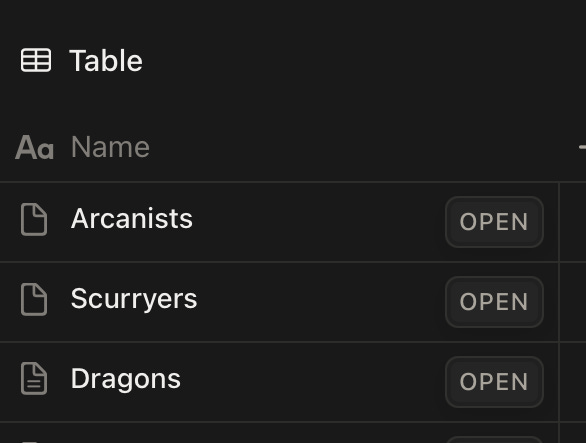How To Exposition
Tell and Show
Hi folks! If you’re new here, this is the 200 Word Novel, where I’m writing a book 200 words at a time, Monday through Friday. Each Friday I post the last week’s progress, raw and largely unedited, along with some reflections on the past week’s writing. If you’re here primarily to read the story, you can find the start of the novel here. If you’re mostly interested in the weekly introspection on writing (and occasional life update), you can find that down below.
Chapter 4
“…we should try to open it in such a way that we can close it back up again,” Bria said.
“Don’t worry. This isn’t for the crate,” Tavi said, adjusting his grip on the hatchet in his hand.
Bria snorted. “Stop being melodramatic.”
“You’re the one who said ‘or alive’!” Tavi stepped closer to the crate, hatchet at the ready. “If we get sprayed by an angry stinkbug or stung by a colony of giant bees—”
“There’s no way there’s a colony of giant bees in that box,” Bria said.
Tavi locked eyes with her and spoke in a voice so serious she couldn’t tell if he was joking or not. “You can’t know that.”
Another snap rang out, and Tavi flinched backwards. Bria gave an exasperated sigh, and with more certainty than she felt inside, stepped forward and pulled a small crowbar bearing the Scurryer’s insignia from her pouch.
“You have an *official* crowbar?” Tavi marveled.
“They’re a regular part of our standard issue tools when we became journeyfolk,” Bria replied.
“Not sure I’ve ever needed a crowbar with a crest to announce the organization for whom I’m crowbarring.”
Bria resisted the urge to ask about other times Tavi has crowbarred things, and instead approached the crate with tool in hand. She shot a look towards Tavi (hatchet held aloft), gave a quick nod, then wedged her crowbar underneath the lid and pulled.
The lid creaked as nails pulled loose, falling relatively smoothly by the wayside. Bria flinched backwards on instinct, and out of her periphery she saw Tavi do the same.
When no swarm of giant bees exited the crate, the two crept forward to peer over the edge.
Inside the crate was a strange, white boulder the size of a small rain barrel. It looked rough and uneven to the touch, with an unusual patterning and texture visible across its surface. Cracks of various sizes ran throughout the stone, from hairline fractures to thick, jagged lines across its surface.
“A rock. How… anticlimactic,” Bria said. She turned to look at Tavi—and found him staring, wide-eyed, the fur on the back of his neck standing up in fluffy tufts.
“Bria. That’s… that’s not a rock.”
“What is it then?” Bria asked, her heart caught somewhere between annoyance and dread.
Tavi slowly lowered his hatchet arm and walked forward, staring intently at the thing in the crate. “It’s an egg.” He looked up and locked eyes with Bria. “A dragon egg.”
A palpable silence hung in the air for a good long while.
“You’re pulling my tail,” Bria finally said, though she knew even before Tavi began shaking his head that he was not. “Where in the world have you seen a dragon egg before?”
“Long story.” Tavi took several steps back. “Here’s a much shorter one: we should leave. Right now.”
“What do you mean, leave—” but Tavi already had turned to start bounding away. “Hey! We can’t just leave a package—or an *egg*—out in the middle of nowhere!”
“If we’re smart, we’d do exactly that,” Tavi shouted back. “You don’t want to mess around with dragons. And especially not with their young.”
“But this is the missing crate! The whole reason we came out here!” Bria turned back and reached into the box. “We have to bring it back with us—”
“Don’t *touch* it, Bria! Are you mad?” Tavi appeared next to Bria so quick it made her head spin a little, as he gently but firmly pulled her paw away from the container. “Dragons have an even better sense of smell than you or I.”
“Since when is my partner a dragon expert?”
The serious look Tavi shot her way made Bria pause. “Just, trust me on this one.”
Bria bit her lip, keenly aware not only of the tension of the moment, but also of the fact that Tavi still held her hand tightly in his own.
Before she could say something in response, however, another *crack* from the crate pulled both of their attention. Bria turned just in time to see another hairline fissure emerge on the surface of the object.
“Oh. Oh no,” Tavi said.
The crack did not acknowledge Tavi’s declaration (request? prayer?), and instead continued to widen and split the stone-like exterior. Little pebble-esque chips flew off as it expanded and blitzed around and down to form a jagged loop upon itself, a full circle of cracked substrate. On pure reflex, Tavi pulled Bria close as he turned his back on the crate just in time, shielding her from the burst of dust and rubble that erupted forth. From under his arm, Bria saw a little beak-like snout burst through the stony shell, watched tiny nostrils flare, steamy breath curling into the frigid air, marveled as the dragonling tumbled forward and out of the egg then the crate, alabaster scales almost disappearing against the pure white snow.
Tavi whirled around, looking at the tiny dragon before them now slowly unfurling its wings, uncertain and off balance. “Oh no,” he repeated. Then, noticing the hatchet still in his hand, he quickly tucked the weapon back on its loop on his waist. “Nope nope nope,” he uttered helpfully, scrambling backwards from the creature.
Bria marveled at how complete it looked. There was no doubt it was a dragon—something she had only seen pictures of and read about in books, and heard stories of from far more senior Scurryers—yet it stood no larger than a baby riding beetle.
“It’s cute,” she said, before she could stop herself.
“So are baby fire ants, right before its colony finds and dismembers you.”
Bria looked at Tavi, genuine concern in her eyes. “Sometimes, I worry about you, Tavi. And the things you’ve seen.”
🐭
Explain the Thing Only When You Have To Explain The Thing
As a writer, we’re excited to tell you all about the cool ideas and weird ways our fantasy world works and the magic systems and factions of the setting we’re creating. But learning how to weave that into a story so it doesn’t kill its pacing, or overwhelm the reader in proper nouns and foreign concepts, or bog down prose with massive passages describing dwarven lineages or locations (looking at you, *Tolkien* (yes, even the best of the best are guilty of such crimes from time to time (and isn’t that reassuring?))) is hard.
(like, we get it Tolkien, yeesh.)
For this story, I started by mapping out as little as possible. I had a rough idea of a world premise (the setting is populated by animals), an inciting incident and change in the world ([Spoilers spoilers, redacted spoilers]), and one (then a second) main protagonist with a few key defining traits.
The rest I’m discovering as I write.
This means that I’m often making decisions about details of worldbuilding as I encounter it. Which is, as you may have deduced from this section’s title, also the adage and wisdom of how best to handle exposition. Lucky me!
The guidance here is simple. Generally speaking: rather than front-loading exposition or details about things in clunky passages, you let readers know about information as they come up in the world, as your characters experience it, and as readers need to know the information. Rather than describing “Mary’s cerulean eyes, blonde hair, and 5’10” athletic build” at the start of the story, you have her catch sight of her blue eyes in the dirty mirror of the gym as she tries not to be late for work three paragraphs in.
There are, of course, many exceptions to this guidance (such as when you’re planting information early to foreshadow or set up an event where readers knowing how something works already is helpful), and there’s plenty of times you can get away with indulgent exposition by virtue of the quality of your prose or coolness of your worldbuilding (see, again, Tolkien). But weaving your facts so they support and enrich your storytelling is usually stronger than explaining things in long passages when readers aren’t yet invested in characters or events that drive their interest.
Writing vs Editing
Presently, I’m trying to write my 200 word novel without too much editing. That’s because it’s easy to get caught up in polishing what you have instead of pushing forward to finish the rest of the story. It’s also easy to get lured into infinite worldbuilding and planning instead of, you know, writing the novel.
But, it’s also good to plan some things out.
This week, for example, as I knew the thing that Tavi and Bria would discover is a dragon’s egg, I also knew there were infinite questions about how dragons work that I would want to have some answers for, to provide consistency in what happens in the future.
As such, I have a notes doc where I jot down key details and truths. Just so future me isn’t drowning in trying to remember facts I established months ago.
At the same time, I also have already noticed little inconsistencies and/or details I realized I wanted later. A great example of this: do I describe character limbs as paws or hands?
Did I start with one, slide into the other, then decide to go with hands after all? Maybe. Maybe.
But details like this definitely is something I’m gonna leave to the (many) editing passes waiting when I finish draft one.
Over the course of writing this book, it’s almost guaranteed that I’ll make some decisions that need to change, or that become inconsistent (or that I discover doesn’t line up) to where events head. I’ve discovered that unless it completely blocks me from making forward progress or for things to make some kind of sense, it’s rarely worth slowing forward momentum to change.
That’s all for this week. As always, thanks for reading—and see you in 1000 words. 💙


